Nine out of ten coffee enthusiasts would agree that the right grind size is a must if you want superior coffee. But when it comes to choosing between electric and manual coffee grinders, the decision isn't always clear-cut.

On the one hand, manual grinders offer an intimate, hands-on brewing experience that appeals to purists who revel in the ritual of coffee preparation.
Electric grinders, on the other hand, promise convenience and consistency — perfect for those who prioritize efficiency and precision when making coffee.
Are you team hand-crank or team push-button? Allow us to guide you through the ins and outs of manual coffee grinders and their electric counterparts so you can figure out which grinder type is your ticket to flavor town.
So fix yourself a cup, get comfortable, and let us tell you more about coffee grinders.
Why Grinding Coffee is Essential
Coffee is sensitive and complex. To achieve the perfect cup, you need keen attention to detail and precise control over the brewing process. Small adjustments in variables such as grind size, water temperature, and brewing time can significantly alter the taste and quality of the coffee.
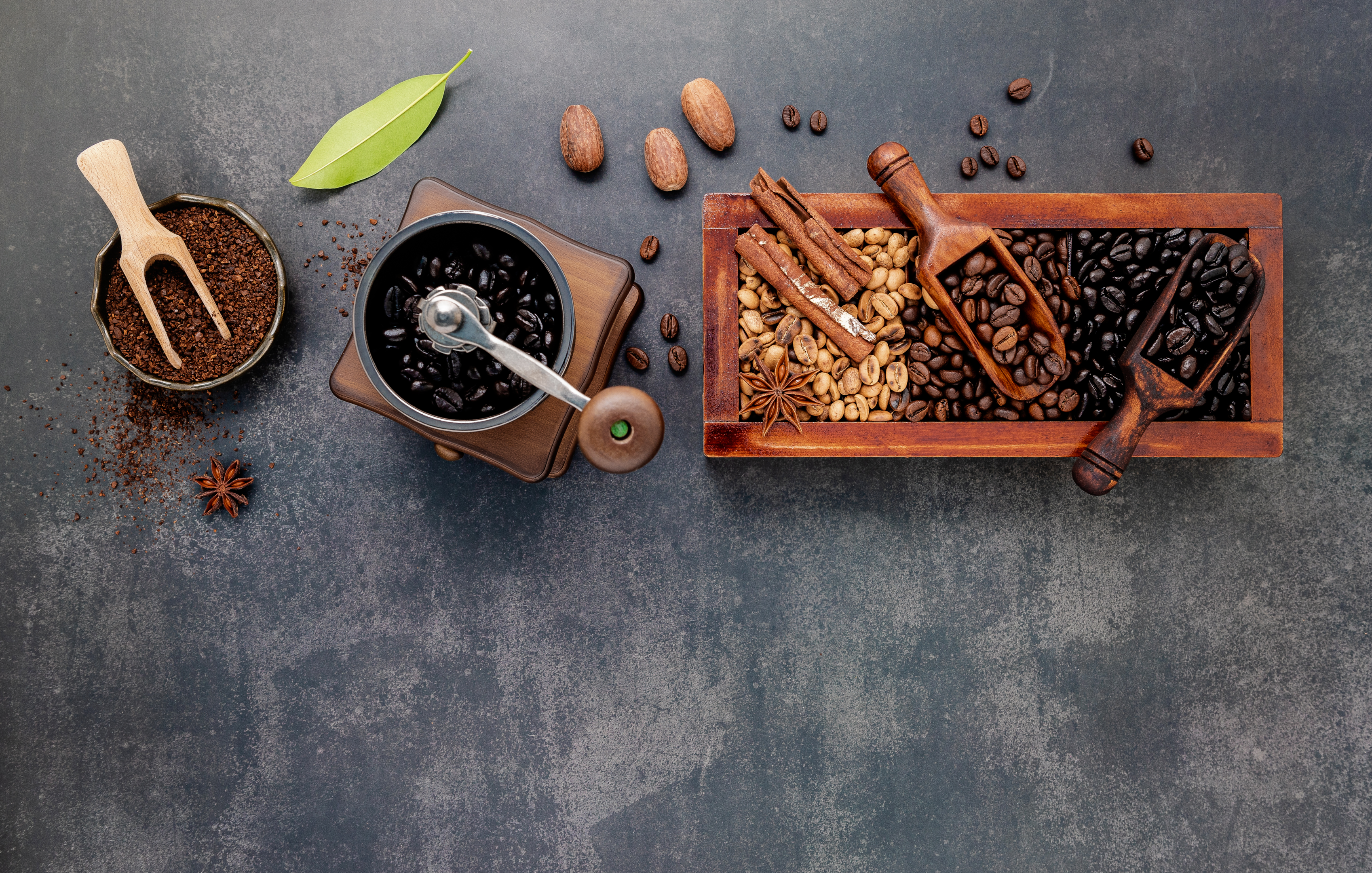
This intricacy is what makes grinders such a crucial part of coffee-making. The right coffee grinder not only accommodates coffee's finicky nature but also allows you to extract the best possible flavor from your coffee beans.
Understanding Grind Sizes
Grinding coffee is a critical step in the coffee-making process. It impacts the flavor, body, and aroma of the coffee.
Grind size determines how the water interacts with the coffee grounds: a finer grind means more surface area for extraction, which yields a richer flavor. However, fine grinds involve a higher risk of over-extraction and bitterness.
Meanwhile, coarse grinds may result in under-extraction, producing a brew that lacks strength and complexity.
Mastering Your Grind
Understanding and adjusting the grind size according to your brewing method is key to enhancing the taste profile of your joe. It doesn't matter if you're experimenting with different brewing techniques or refining your daily coffee ritual; the right coffee grinder can bring your coffee experience to the next level.
What's the right grinder for you, you ask? The best coffee grinder — be it manual or electric — depends on your personal preferences, lifestyle, and how much you value the ritual versus the convenience of coffee making.
When you master the grind, you're one step closer to achieving the ideal cup.
Manual Coffee Grinders
Manual coffee grinders, also known as hand grinders, use a straightforward, hand-powered mechanism featuring two burrs — one stationary, another rotating with the turn of a handle — that effectively crush coffee beans between them.
Users can adjust the space between burrs for fine to coarse grind sizes, ensuring precision and control over the consistency of the grind.
The hands-on grinding process not only provides control over the grind size but also offers a more engaging coffee preparation experience.

Advantages of Manual Grinders
-
Portability and convenience for travel. Manual coffee grinders are a boon for coffee aficionados on the move. Compact and requiring no electricity, they're perfect for bringing along on camping trips or vacations. With a manual coffee grinder, you never have to compromise on the quality of your morning brew even if you're outdoors.
-
Greater control over grind size. Hand grinders allow precise control over the grind size. By manually adjusting the grind, you can achieve the exact texture needed for different brewing methods — from fine for espresso to coarse for French press — based on the resistance you feel during grinding.
-
Quiet operation for early mornings. Unlike their electric counterparts, manual coffee grinders operate quietly, making them ideal for those early mornings when you want to grind coffee in peace or don’t want to disturb the rest of the household.
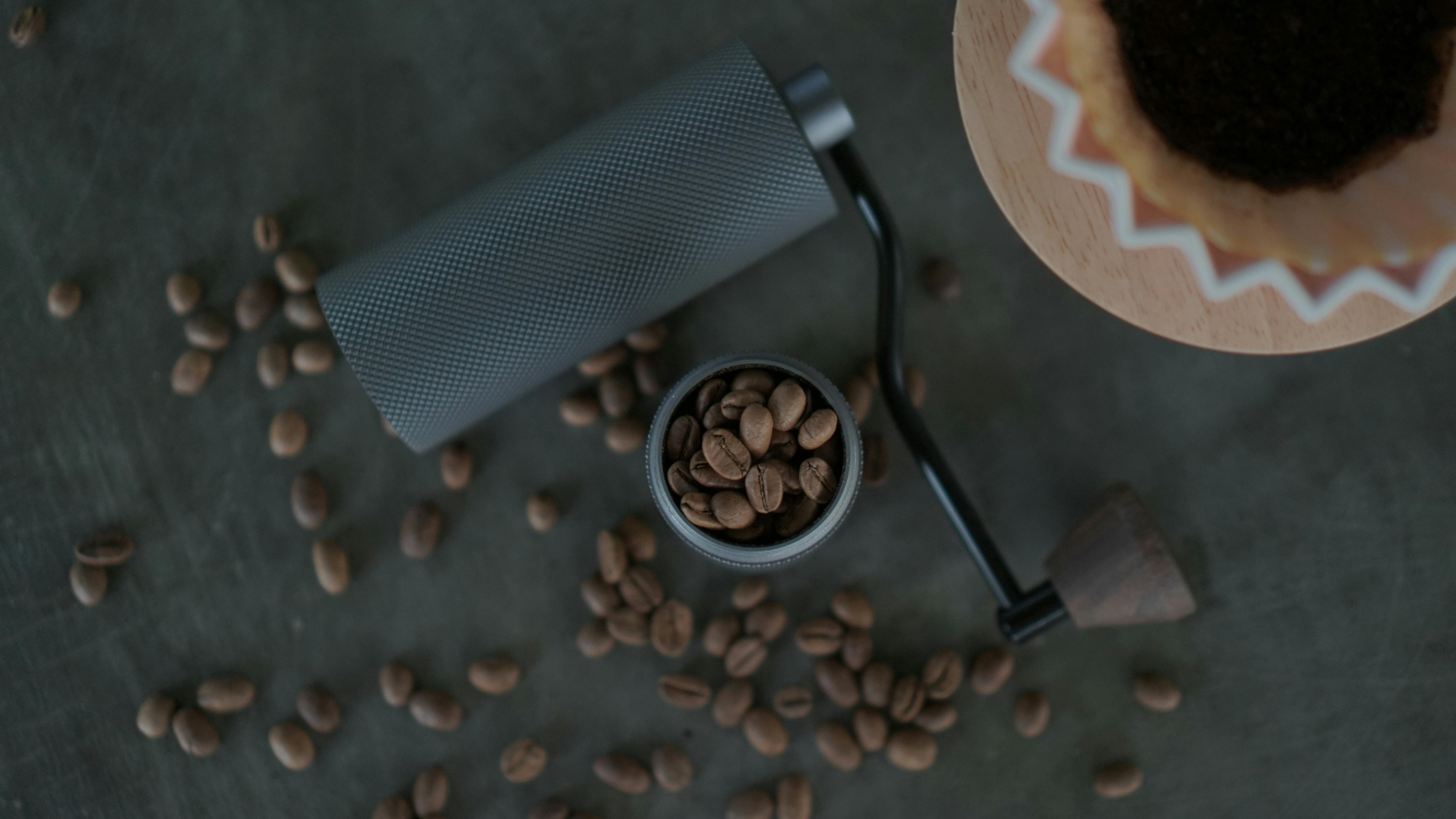
Disadvantages of Manual Grinders
-
Time and effort required for grinding. The main drawback of using a manual grinder is the elbow grease it requires. On average, it takes about a minute to grind coffee beans using a manual coffee grinder. Grinding enough beans for a single cup is manageable, but the process can become tiresome if you're brewing multiple cups or prefer ultra-fine grind.
-
Limited capacity for larger batches of coffee. Manual grinders typically have smaller capacities than electric grinders, making them less suitable for preparing large quantities of coffee at once. This could be a limiting factor if you frequently host coffee gatherings or need to brew several cups at a time.
-
Inconsistent coffee grounds. Achieving uniform grind sizes with manual grinders can be particularly challenging for beginners or those in a rush. Inconsistent grinds can mean that won't get the same taste you want with every batch, unless you are a seasoned manual coffee grinder user. This variability is an important consideration especially if you want precision and consistency in your coffee preparation.
Ideal Scenarios for Manual Grinder Use
-
Coffee lovers who enjoy the grinding process. If you enjoy a hands-on approach to coffee-making and cherish the ritual of grinding your beans, a manual grinder is an excellent choice. It allows for a more intimate and meditative brewing experience.

-
Those with limited kitchen space. Compact and sleek, the manual coffee grinder is ideal for coffee lovers with small kitchens or limited counter space. It can easily be tucked away when not in use, unlike bulkier electric grinders.
Electric Coffee Grinders
The electric coffee grinder offers convenience with its easy-to-use, electrically powered design that eliminates manual effort — you only need to push a button or flip a switch, and you get freshly ground coffee with ease.
Available in blade or burr types, electric grinders cater to various preferences and come in two basic types:
-
Blade grinders. With blades that spin quickly, these grinders chop coffee beans efficiently. They're suitable for casual use despite producing a less uniform grind.
-
Burr grinders. Electric burr grinders, like their manual counterparts, crush beans between two surfaces for a consistent grind and offer precise control over the grind size.
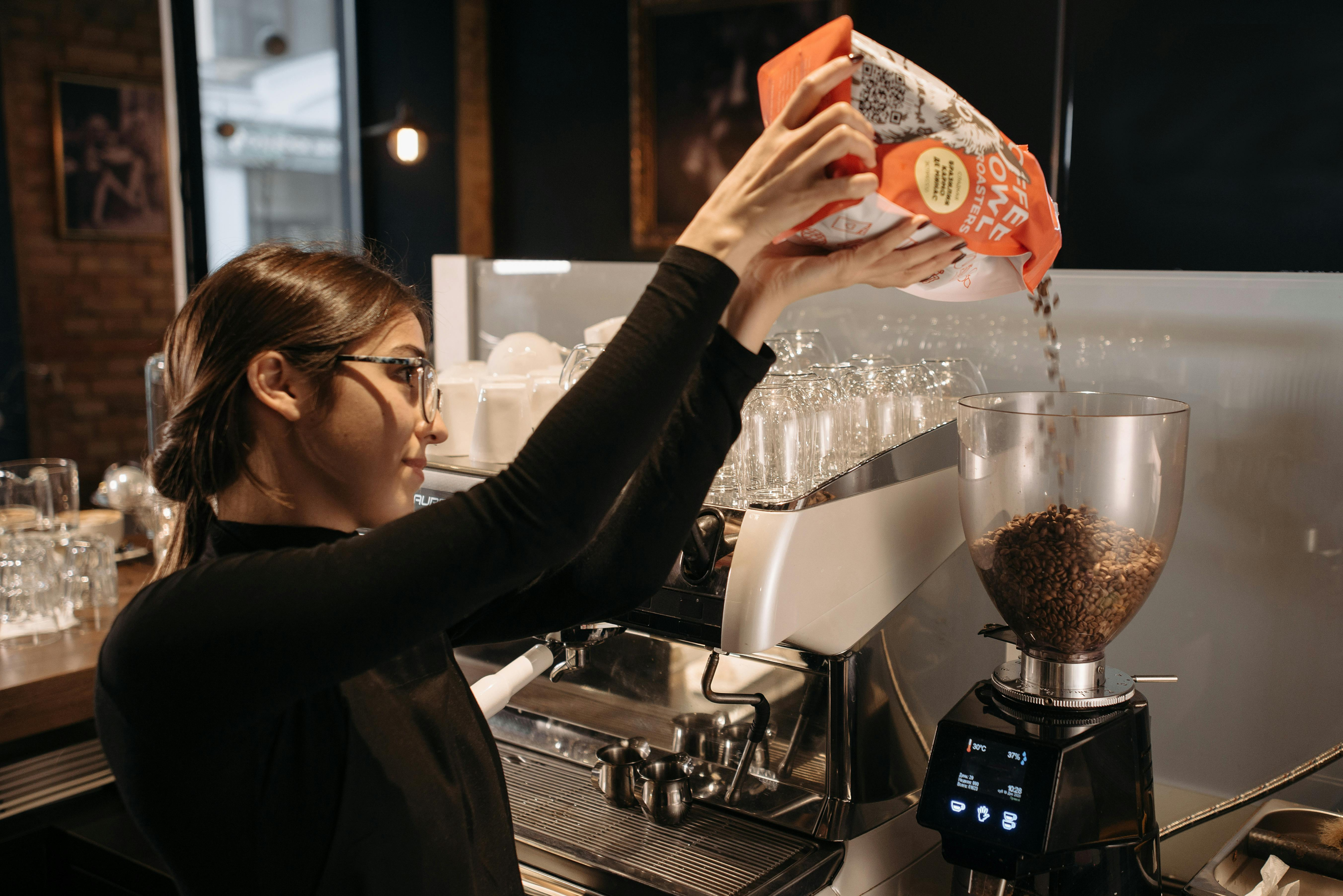
Advantages of Electric Grinders
-
Quick and efficient grinding. Electric grinders excel in speed and efficiency, turning coffee beans into grounds in a matter of seconds. This feature is particularly beneficial for those mornings when time is of the essence or whenever you need a quick coffee fix.
-
Suitable for larger quantities. Need to brew multiple cups of coffee? Equipped with a tiny hopper for coffee bean storage, an electric grinder lets you prepare coffee for a group without the labor-intensive process required by a manual grinder.
-
Multiple grind settings. Most electric grinders offer a range of settings, allowing users to switch between fine, medium, and coarse grinds easily. If you enjoy experimenting with different brewing methods, from espresso to French press, this grinder type is for you.
Disadvantages of Electric Grinders
-
The noise level. If you prefer a quiet morning routine or live in shared spaces, you might want to consider that though convenient, electric grinders can be loud.
-
The cost. Generally, electric coffee grinders come with a higher price tag than their manual counterparts due to the convenience and features they offer.
Ideal Scenarios for Electric Grinder Use
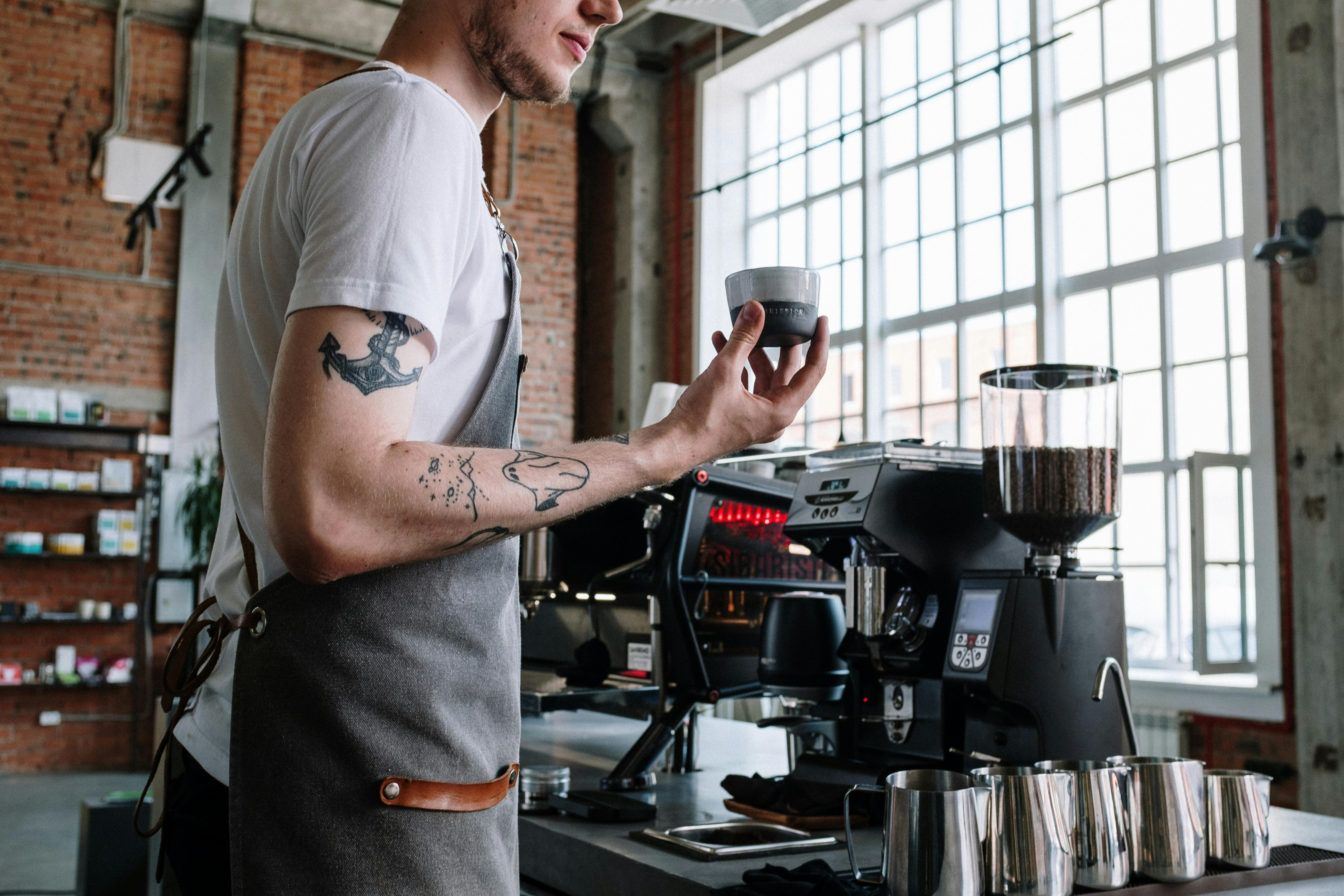
-
Busy coffee fans who seek convenience. The electric grinder simplifies the process and saves time without sacrificing coffee quality, so it's perfect if you value efficiency in your coffee routine, or you have hectic mornings.
-
Those who frequently host gatherings. Do you like entertaining guests?An electric coffee machine can produce freshly ground coffee beans for several cups at once to ensure everyone gets their caffeine fix without the long wait.
Manual vs. Electric Coffee Grinders: Finding Your Perfect Match
Choosing between manual coffee grinders and electric ones is essential for any coffee enthusiast. Each type offers unique benefits and drawbacks, particularly when it comes to grind quality, brewing methods, cost, maintenance, and environmental impact.
Grind Quality and Consistency
Heat generation during grinding significantly affects coffee's taste.
Operated by hand, manual burr grinders produce less heat and preserve the coffee's natural flavors and aromas more effectively — resulting in a richer, more nuanced cup of coffee.
Electric burr grinders, while offering the convenience of quick and effortless grinding, tend to generate more heat due to their motor's speed — slightly altering the coffee's flavor profile.
For enthusiasts who prioritize flavor preservation, manual grinders might be the better choice. Meanwhile, electric grinders represent a compromise between efficiency and quality, appealing to those who value convenience.
Burr grinders — be they manual or electric — are great for getting a consistent coffee grind, which is key for great-tasting coffee. But while electric grinders do this job easily, using a manual grinder takes a bit more skill and effort.
Electric blade grinders chop the coffee beans into uneven sizes with spinning blades that generate more heat than burr grinders. While the inconsistency and additional heat can compromise the coffee's flavor, the resulting grinds are still better than instant coffee.

Best for Brewing Methods
Providing consistency and convenience, electric burr grinders are excellent for brewing methods that demand a precise grind size, such as espresso or pour-over.
However, manual grinders can achieve the same level of precision and are equally effective for these brewing methods when used by seasoned coffee makers who appreciate the control and involvement in the grinding process.
On the other hand, for brewing methods that are more forgiving of grind size variability — like French press or cold brew — the electric blade grinder can be a satisfactory and more cost-effective option.
Initial Investment and Long-Term Value
Manual grinders typically require a lower initial investment than electric grinders. Premium hand grinders offer excellent long-term value, given their durability and the quality of grounds they produce.
Electric grinders, particularly burr models, come with a higher initial price tag but offer significant convenience and speed for frequent coffee brewing or preparing larger quantities. Over time, the convenience and efficiency they provide can justify the initial investment.
Therefore, the decision often hinges on weighing the initial cost against the benefits of convenience and the amount of coffee you typically need.
Maintenance and Durability Considerations
Manual grinders are generally simpler devices with fewer moving parts, making them easier to maintain and more durable over time.
Electric grinders, given their complexity and motorized components, may require more maintenance and are more susceptible to wear and tear — potentially leading to higher long-term costs.
Environmental Impact and Energy Use
Manual grinders have a minimal environmental impact, requiring no electricity and producing no electronic waste. They are the clear choice for eco-conscious consumers.
Electric grinders consume electricity, contributing to their environmental footprint. However, advancements in energy efficiency for home appliances have mitigated this impact somewhat, making them a viable option for those prioritizing convenience.
In the showdown between manual and electric coffee grinders, the best choice depends on your specific needs, values, and coffee brewing habits. Whether you prioritize the ritual of grinding, the precision for specific brew methods, the convenience of a quick grind, or environmental considerations, there’s a grinder that fits your coffee lifestyle.
Making Your Choice: Manual or Electric?

In choosing a coffee grinder, consider your personal preferences and your usual coffee routine. If you enjoy taking your time and savoring the coffee-making process, a manual grinder might be for you. It's also great if you value quiet mornings or need a portable option for travel.
On the other hand, if you're often in a hurry or need to make several cups at once, an electric grinder offers the speed and convenience you might be looking for.
Personalizing Your Coffee Experience
There's no one-size-fits-all answer in the world of coffee grinding. Feel free to experiment with both manual and electric grinders to discover which one suits you best.
Maybe you'll find the tactile pleasure of manually grinding your beans for a single cup of pour-over coffee rewarding, or perhaps the efficiency of an electric grinder fits your busy lifestyle better.
By exploring different options, you can tailor your coffee grinding to perfectly match your taste and daily routine.
Share Your Grind Story!
Have you found the perfect grinder? Then we want to hear from you! Jump into the comments section below and share which grinder has won a place in your coffee routine. Help inspire fellow coffee lovers to find the perfect match; let's brew a community of shared stories and tips!

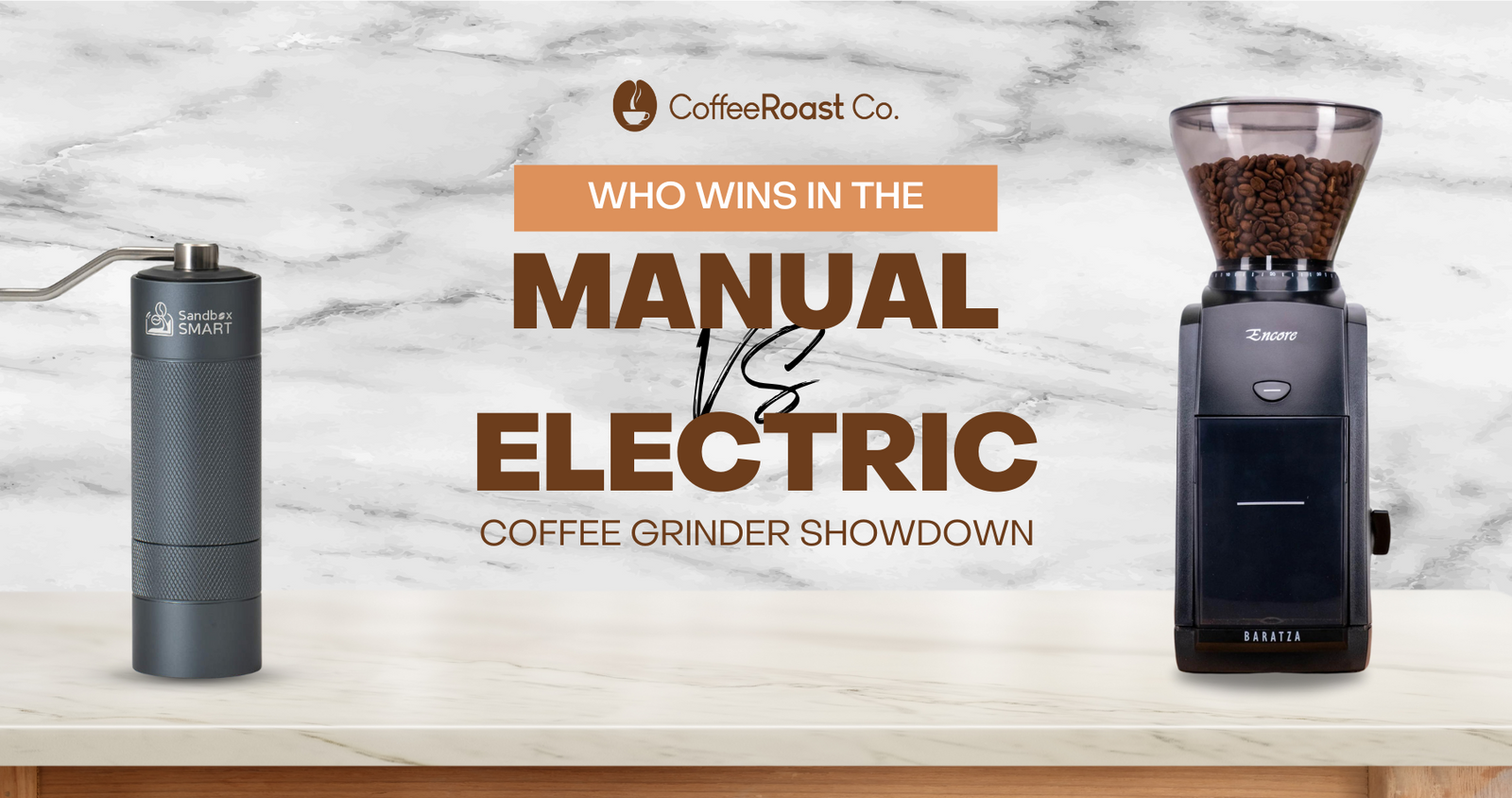



Leave a comment